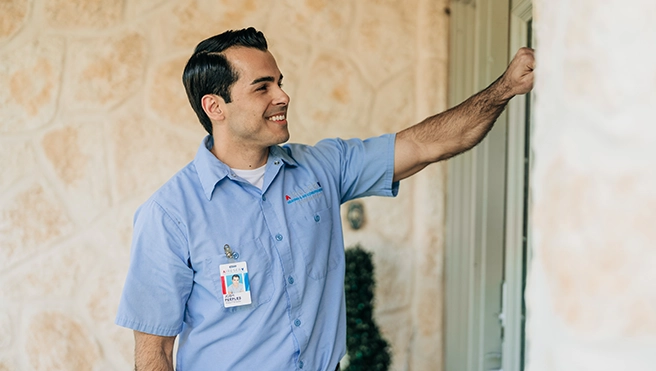Replacement Tips
Should You Repair or Replace Your Heating and AC System?
If your heating and cooling system is more than 10 years old, it may be time to consider replacing it with a more efficient system. There are many factors to consider when determining whether or not to repair or replace a system, such as its age and overall investment costs—from initial purchase price to long term operating costs and utility rates. You should contact your local utility company to see if there are any rebates available for replacing your existing system. They can also tell you about any state rebates.
Conserve Energy without Losing Comfort
Rising utility and overall energy costs are concerns for most homeowners today. Fortunately, you can save money while being “green” by installing a smart thermostat. Programmable thermostats can adjust the temperature when home or away. Learn more about these helpful devices below. Be sure to head to your local garden center to pick up some trees or shrubs that shade the air conditioning unit. Just make sure the foliage is at least three feet away from the unit so it doesn't block airflow. Adding foliage around your home will reduce energy consumption and consequently put more money in your pocket. Additionally, check your attic, crawl space, or basement to make sure they’re properly insulated. A properly insulated space reduces your home’s energy demands.
Save Money with Digital Thermostats
Heating and air conditioning systems use the most energy in a home. One way to keep the costs in check is to install a digital thermostat. This simple gizmo can automatically change a home’s temperature while the occupants are away or asleep for optimum energy efficiency. For every degree a thermostat is set back during an eight-hour period—or more during air conditioning season—the energy savings equals up to one percent. Set the thermostat back 10 to 15 degrees for the eight hours you’re away or asleep and the savings can reach up to 15 percent.
Three Types of Programmable Digital Thermostats
There are three types of programmable thermostats:
-
A 5+2 model has a setting schedule for weekdays and another for weekends.
-
The 5-1-1 model has one setting schedule for Monday through Friday, one for Saturday and one for Sunday.
-
The flexible 7-day model allows a different daily schedule with up to four different temperatures and time periods each day.
Some more advanced units run diagnostic programs and can tell homeowners information such as when to change the air filter. There are even units that start heating or cooling early so the scheduled temperature is reached at the desired time. A local Aire Serv expert can help in the selection and installation of the best model for your home.
Eight Home Energy Saving Tips
Here are our top energy saving tips from the service experts at Aire Serv:
- Change the system’s filter each month to help it work properly.
- Install a programmable thermostat. Increasing the temperature two degrees to five degrees for the eight hours you’re at work can result in energy savings—but don’t turn off the system completely; it takes more energy to cool a hot house! For summer months, only set it as high as is comfortable.
- Install an attic fan. It can remove hot air from the attic so the air conditioner doesn’t have to work as hard.
- Relocate the air conditioning unit to the shade. A unit operating in the shade uses as much as 10% less electricity than one in the sun.
- Use the ceiling fan only when you’re in the room. Running the fan doesn’t lower the temperature, but it does increase evaporation from your skin to help you feel cooler.
- Keep lamps, televisions, and other heat-producing appliances away from the thermostat.
- Close the blinds on the southwestern side of the house during the day.
- Avoid closing off vents in unused rooms. Cooling systems are designed to cool the whole house. Closing off vents can cause indoor cooling coils to freeze up.
Ways to Beat the High Costs of Cooling Down this Summer
Summer means starting up your home’s air conditioning system. Unfortunately, it can also heat up your utility bills.
Aire Serv offers these energy auditing tips:
- First, have the system checked by a professional to make sure everything is running at peak efficiency.
- Second, check the level of insulation in your exterior and basement walls, ceilings, attic, floors, and crawl spaces. Check for holes or cracks around windows and doors and for open fireplace dampers. Also, look out for unsealed ducts in your attic, basement, and crawl spaces.
- Third, make sure nothing is blocking the system’s air return inlet, such as a piece of furniture or a rug. This could decrease the air conditioner’s performance.
- Lastly, look for ways to use natural light to reduce the time your lights are on, and replace your bulbs with the newer, high-efficient light bulbs and lamps.
Feel comfortable in your own skin. And your own home. Call the team at Aire Serv to find out how we can get your property feeling just right.

Let Us Call You
About Aire Serv
Established in 1994, Aire Serv® is a global franchise organization providing electrical installation and repair services. Recognized by Entrepreneur magazine among its “Franchise 500,” Aire Serv franchisees provide these services to both residential and commercial customers at almost 200 locations worldwide.
